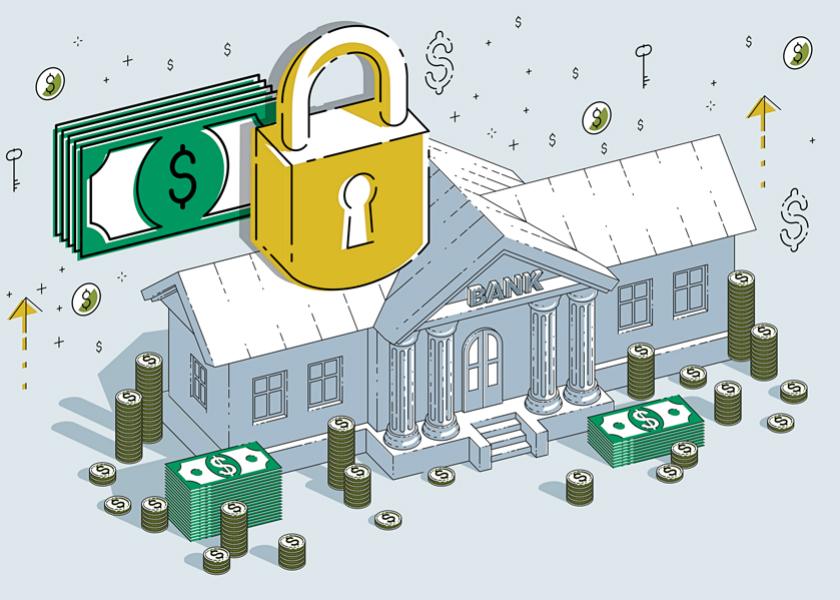In 2022, the Chapter 12 bankruptcy rate reached the lowest level in nearly two decades, 0.78...
What Farmers and You Can Learn from the Recent Bank Collapses

In mid-March, bank regulators shuttered and seized deposits from two high-profile banks: Silicon Valley Bank and Signature Bank. The bank collapses sent tremors through the financial system — surfacing memories of the global crisis in 2008.
Even though it’s easy to draw comparisons, Ernie Goss, Creighton University economist, says the current banking situation is not like the financial industry crisis in 2008 and 2009. That meltdown was caused by the loss in value of mortgage-backed securities.
The other issue at play was concentration, says Nate Franzén, President of Ag Banking at First Dakota National Bank. “Silicon Valley Bank was very heavily concentrated in the tech sector, which has been hit hard by the rising rate environment,” he says. “Also, the tech sector is naturally higher risk because it is heavily weighted towards startup businesses who are yet to prove they can make a profit.”
Assess Your Risk
While the fall of these two large banks is unique, they do provide lessons for financial management. First, understand your bank’s loan portfolio.
“About 35% of our bank’s total loan portfolio is in agriculture,” Franzén says. “That’s a fairly high concentration, but for comparison Silicon Valley Bank’s portfolio was mostly made up of venture capital tech industry firms.” Even if the bank is primarily focused on agriculture, that’s not necessarily a red flag. Many banks diversify their ag lending portfolio by type, size and location of grower, he adds.
Ask the lender how much of your deposit dollars are guaranteed by the Federal Deposit Insurance Corporation (FDIC). In many cases, Franzén says, that will be a large percentage.
If you do keep a high level of funds deposited at banks, you can increase the FDIC insurance coverage. One way is to have deposits at multiple banks, although, this can increase paperwork, relationships, etc. Another way, Franzén says is many banks offer a program called IntraFi Network Deposits, which allows deposits larger than $250,000 to effectively become FDIC-insured. (FDIC’s insurance limit is $250,000 per depositor per bank.) “This system works very well and only has a small cost, plus you can do it through an existing bank,” he says.
Also, have faith in the banking system, Franzén advises. “Even if the bank gets into financial trouble, you are still entitled to the terms of your loan.”
Ag Economy Strength
Another positive is most banks in rural America and large farming areas are less susceptible because they have less risky depositors. Goss says the farming community was in solid financial condition going into the recent series of interest rate hikes.
For example, the March Rural Mainstreet Index, a survey of bank CEOs in rural areas of a 10-state region that are dependent on agriculture, showed 14% of bankers tightened credit standards for farm loans in the last year in the face of rising interest rates.
Take it to the Bank
These current events serve as an important reminder that strong financial management – beyond bookkeeping and accounting – is needed today, says Jay Jung, strategic financing expert and founder of Embarc Advisors. He provides these tips:
- Have a 30-, 90- and 365-day cash forecast and emergency funding plan for your business.
- Assess your liquid assets so you could quickly access 90 days of cash needs, if an emergency arises.
- Review your account details to make sure you have more than one person set up for ACH/wire transfer approval permissions.
EDITOR’S TAKE:
The recent bank failures have certainly caused most Americans to pause and, at the very least, question what the true status of our banking system is. This article points out compelling reasons why some banks are more suspect than others. It also offers some great advice to farmers and, for that matter, anyone with a banking relationship – at least some things we should be on the lookout for. However, one thing really stands out – agricultural banks or portfolios are extremely solid when it comes to risk. In fact, farmers/ranchers have been paying down loans at a record pace the past couple of years. So, be sure to ask that person walking into your showroom – “Are you a farmer or rancher?” If they are, chances are very good that they are a serious buyer with great credit.







